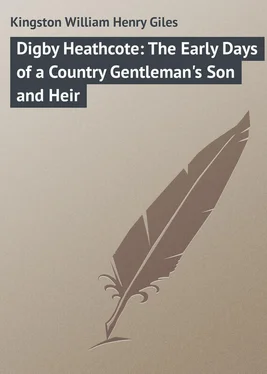William Kingston - Digby Heathcote - The Early Days of a Country Gentleman's Son and Heir
Здесь есть возможность читать онлайн «William Kingston - Digby Heathcote - The Early Days of a Country Gentleman's Son and Heir» — ознакомительный отрывок электронной книги совершенно бесплатно, а после прочтения отрывка купить полную версию. В некоторых случаях можно слушать аудио, скачать через торрент в формате fb2 и присутствует краткое содержание. Издательство: Иностранный паблик, Жанр: foreign_prose, foreign_children, на английском языке. Описание произведения, (предисловие) а так же отзывы посетителей доступны на портале библиотеки ЛибКат.
- Название:Digby Heathcote: The Early Days of a Country Gentleman's Son and Heir
- Автор:
- Издательство:Иностранный паблик
- Жанр:
- Год:неизвестен
- ISBN:нет данных
- Рейтинг книги:5 / 5. Голосов: 1
-
Избранное:Добавить в избранное
- Отзывы:
-
Ваша оценка:
- 100
- 1
- 2
- 3
- 4
- 5
Digby Heathcote: The Early Days of a Country Gentleman's Son and Heir: краткое содержание, описание и аннотация
Предлагаем к чтению аннотацию, описание, краткое содержание или предисловие (зависит от того, что написал сам автор книги «Digby Heathcote: The Early Days of a Country Gentleman's Son and Heir»). Если вы не нашли необходимую информацию о книге — напишите в комментариях, мы постараемся отыскать её.
Digby Heathcote: The Early Days of a Country Gentleman's Son and Heir — читать онлайн ознакомительный отрывок
Ниже представлен текст книги, разбитый по страницам. Система сохранения места последней прочитанной страницы, позволяет с удобством читать онлайн бесплатно книгу «Digby Heathcote: The Early Days of a Country Gentleman's Son and Heir», без необходимости каждый раз заново искать на чём Вы остановились. Поставьте закладку, и сможете в любой момент перейти на страницу, на которой закончили чтение.
Интервал:
Закладка:
Digby and Kate having ascertained that their device had taken the full effect they anticipated, hauled up their figure, and packing it away in the basket, in which operation they considerably blackened their hands and dresses, sat down till John should join them. Getting tired of doing nothing, they cautiously approached the edge of the gravel-pit, when, looking over, they saw the wretched old couple still on the ground. They were very much alarmed when they found that they did not move, thinking perhaps they had really frightened them to death.
“Oh dear, oh dear, I wish that we hadn’t done it,” exclaimed Kate, looking very miserable. “And I to have led you to help me. It was very naughty of me, I know. I know – I know it was.”
“Oh no, Kate, it wasn’t all your fault; I’m sure I thought it was very good fun,” answered Digby. “Perhaps, after all, they are not dead. I’ll go and have another look.” Digby approached near, stooping down, and when he looked over he saw the dame lifting up her head and gazing cautiously around. She did this more from instinct or habit than because she fancied any one might be near. Digby thought that she must have seen him. He crept back to Kate, satisfied, at all events, that she was not dead; and John Pratt soon afterwards joining them, he shouldered the basket, and they set off as fast as they could for the Hall. What to do with the imp, which had played so prominent a part in the drama, was a puzzle, till John undertook to carry it home, and burn it.
When they got back to the Hall the state of their dresses and their hands, which were more than usually dirty, caused some grave suspicions in the mind of Mrs Barker, the head nurse, who had to prepare them to come in to dessert, after dinner; and she was not long in ascertaining from Digby what had really occurred. She thought it very wrong in John Pratt to have assisted in such a proceeding; but he was a favourite, and she was afraid that if she made much of the matter she should bring him into trouble; she therefore merely gave Kate and Digby a lecture, and they fancied that they had escaped without any further ill result from their frolic. It happened, however, that that very evening a neighbour of Dame Marlow’s came running to the vicarage to say that the dame and her old man were both very ill, that they had something on their consciences, and that they wished to see the vicar and to disburden them.
Mr Bowdler was ever at the call of any of his poor parishioners who sent for him. Although he had but just finished his frugal dinner, and taken his books and sat down to enjoy himself after his own fashion, in communing in thought with great and good men. He rose from his seat, and said he would go immediately.
It was a fine moonlight night, and so he mounted his horse and trotted off to Mile-End. He found the old couple not nearly so ill as he expected, but still suffering very much from fear. I need not repeat in their own words what they said.
The dame confessed that she had done many wicked things, and that she had tried to impress people with a belief in her supernatural powers, though she knew that she was a weak old woman, without any power at all. At length, however, while she was endeavouring to frighten an honest man out of his senses, the spirit of evil had himself appeared down the chimney, and very nearly frightened her and her husband out of theirs. What she had sent to Mr Bowdler for was, it appeared, not so much to say how sorry she had been, but to entreat him to exorcise the evil spirit, so that he might not venture to come back again.
Mr Bowdler looked grave. He might have said that prayer, and penitence, and watchfulness, were the only preventives against the approach of the evil one. However, in the present instance, he did not like to say this. The fact was that he had become completely enlightened from what he had just heard as to the true state of the case. After taking luncheon at the Hall, he had strolled, as he had been requested to do, through the grounds. The day being very fine, and not having been before at the Mound, he hunted about till he found his way through the labyrinth, and then he climbed up to the summer-house to enjoy the view which, he had been told, could be seen from it. Just as he was leaving the building, the little imp under the table had caught his eye. He pulled out the monster, and could scarcely help indulging in a smile as he examined it. He doubted, however, whether he ought to leave it there, or carry it off; but guessing from the workmanship that young hands had formed it, and recollecting Kate and Digby’s glances at luncheon, he had little difficulty in guessing that it was the produce of their ingenuity. Had he been less of a stranger, he would, I have no doubt, have taken it away, or stopped and remonstrated with them on the impropriety of making such a figure; but he was a judicious man, and he feared that he might injure his future usefulness in the family by appearing officious. He was a man who only placed confidence in good principles. He believed that preaching against one sin, or one fault, and leaving sin in general, evil dispositions unassailed, produced no permanent effect. However, he resolved to keep his eye on his young friends, and to speak to them when he could find a favourable opportunity. He now at once discovered how the figure had been employed, though he could scarcely persuade himself that Kate and Digby alone could have carried out by themselves the drama which had evidently been enacted. He did not mention his suspicions to the old couple, but he strongly urged them to repent of their evil ways, and to resolve in future to lead better lives. He assured them that neither he nor any other mortal man had the power of exorcising evil spirits; and they were silly old people to fancy so. As to what they had seen, he did not choose to pronounce an opinion; but he told them that they ought to have stopped and examined it, and that then they would probably not have been so much frightened. He was not very well satisfied, however, with the result of his visit.
“This is a pretty prank for these young people to play,” said he to himself, as he rode home. “It is high time that Master Digby should be sent to school, and that Miss Kate should have a governess to look after her. If something is not done they will be getting into some worse scrape before long. I must try and speak to Mr Heathcote on the matter. He appears to think that they are still babies, and never seems to dream of the rapid development of their genius for mischief.”
Not long after this, Julian Langley, who had not yet been sent to school, was invited to spend a few weeks at the Hall. From what I have said it may be supposed that he was not likely to do Digby any good. Kate, from the first, could not abide him; and even John Pratt looked at him with no little suspicion. Julian was tall for his age, with a slight figure, fair, with light hair, and an inexpressive rather than a bad countenance. I believe that his was one of those characters which may be moulded without difficulty either for good or for ill, according to the hands into which they fall. Nothing would have made Julian Langley a very great man, or a very important member of society; but he might have become, by proper care and culture, useful in his generation, and religious and happy. Alas, poor fellow, how different was his lot. He could discourse very learnedly about horses and dogs, and all sporting matters; and of course Digby thought him a very fine fellow. It was not long before he led Digby into a variety of scrapes.
The first Sunday after his arrival all the family went to church. The Bloxholme pew had very high sides and curtains, and was directly in front of the pulpit, the preacher being the only person who could look directly down into it. Outside it, also facing the pulpit, there had, from time immemorial, been seats for a number of poor and old people. One of the occupants was an old man, who wore a scratch-wig; he was very deaf, also, and as he could not hear a word the vicar said, he invariably fell asleep during the sermon, and, as was often the case, if he had any cold, snored loudly.
Читать дальшеИнтервал:
Закладка:
Похожие книги на «Digby Heathcote: The Early Days of a Country Gentleman's Son and Heir»
Представляем Вашему вниманию похожие книги на «Digby Heathcote: The Early Days of a Country Gentleman's Son and Heir» списком для выбора. Мы отобрали схожую по названию и смыслу литературу в надежде предоставить читателям больше вариантов отыскать новые, интересные, ещё непрочитанные произведения.
Обсуждение, отзывы о книге «Digby Heathcote: The Early Days of a Country Gentleman's Son and Heir» и просто собственные мнения читателей. Оставьте ваши комментарии, напишите, что Вы думаете о произведении, его смысле или главных героях. Укажите что конкретно понравилось, а что нет, и почему Вы так считаете.












